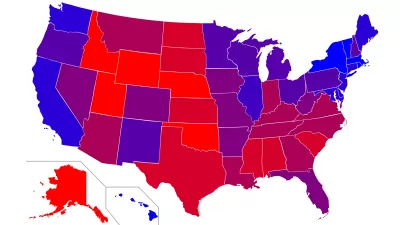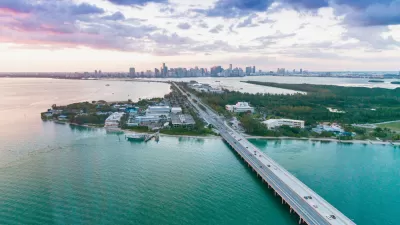In this op-ed, Arthur B. Laffer and Stephen Moore analyze the recent Census findings showing renewed migration from the Northeast and Midwest to the South and Southwest. They note the movement is clearly from blue states to red, and explain why.

The earlier Census Bureau findings reported here showed the movement to predominantly politically red (Republican) states from blue (Democratic) states. Laffer, a member of President Reagan’s Economic Policy Advisory Board for both of his two terms (1981-1989) and chairman of Laffer Associates, and Moore of the Wall Street Journal's editorial board, attribute the economic attraction of the red states to three reasons:
- Low or zero income taxes: "We predict that within a decade five or six states in Dixie could entirely eliminate their income taxes. This would mean that the region stretching from Florida through Texas and Louisiana could become a vast state income-tax free zone", they write.
- Business-friendly, as in the restrictiveness of regulations that could stifle business growth. The fracking moratorium in New York is held up as a model for "business-unfriendly" and point to neighboring Pennsylvania where the natural gas industry is flourishing. In energy-intensive Texas, four of the top ten metro areas (in growth) were located.
- Having "right-to-work" laws that make it more difficult to unionize workers. In addition, they blame high minimum wage laws that "price low-income workers out of the job market."
Laffer and Moore see domestic migration as vindication that the low tax and business friendly policies of red states are succeeding while high tax and business unfriendly policies in the blue states are failing.
Readers responded - offering additional reasons for the domestic migration.
See the 15 fastest growing large metros in this Washington Post article.
Correspondent's note: Access to Wall Street Journal articles for non-subscribers may be limited after April 11.
FULL STORY: Opinion: Laffer and Moore: The Red-State Path to Prosperity

Maui's Vacation Rental Debate Turns Ugly
Verbal attacks, misinformation campaigns and fistfights plague a high-stakes debate to convert thousands of vacation rentals into long-term housing.

Planetizen Federal Action Tracker
A weekly monitor of how Trump’s orders and actions are impacting planners and planning in America.

Chicago’s Ghost Rails
Just beneath the surface of the modern city lie the remnants of its expansive early 20th-century streetcar system.

Bend, Oregon Zoning Reforms Prioritize Small-Scale Housing
The city altered its zoning code to allow multi-family housing and eliminated parking mandates citywide.

Amtrak Cutting Jobs, Funding to High-Speed Rail
The agency plans to cut 10 percent of its workforce and has confirmed it will not fund new high-speed rail projects.

LA Denies Basic Services to Unhoused Residents
The city has repeatedly failed to respond to requests for trash pickup at encampment sites, and eliminated a program that provided mobile showers and toilets.
Urban Design for Planners 1: Software Tools
This six-course series explores essential urban design concepts using open source software and equips planners with the tools they need to participate fully in the urban design process.
Planning for Universal Design
Learn the tools for implementing Universal Design in planning regulations.
planning NEXT
Appalachian Highlands Housing Partners
Mpact (founded as Rail~Volution)
City of Camden Redevelopment Agency
City of Astoria
City of Portland
City of Laramie




























